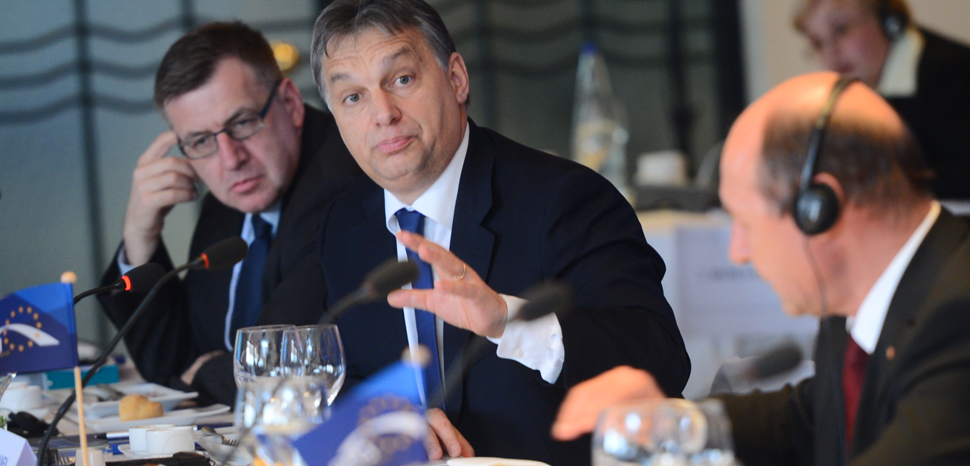When phrases such as authoritarianism, totalitarianism, and fascism are used to describe the actions of modern governments, images of 1920s Italy, 1930s Germany, and 1950s USSR come to mind. The world wants to believe that this type of situation can never happen again, but the sentiments of extremist government are never far from the surface. These attitudes did not simply disappear after World War II, but rather insidiously latched onto certain factions of society. Today, a diluted version of these ideas is being exhibited by Hungary’s government, except Hungary has disguised it as an ‘illiberal democracy,’ as classified by Prime Minister Viktor Orbán. Although not nearly as extreme as the mid-twentieth-century manifestations, Hungary’s authoritarian policies draw some parallels to these former regimes.
In 2010, the Fidesz party came to power in a sweeping electoral victory. Since then, Orbán and his government have steered hard to the right. The prime minister promotes an ‘illiberal democracy’ to protect a Christian Hungary and does not hide his disdain for liberal internationalism. The ideas of equality, civil liberties, and freedom of the press are scoffed at by Orbán, and are frequently overshadowed by his anti-immigration and anti-Semitic rhetoric. Orbán’s strategy to further marginalize groups in society, such as migrants, echoes similar themes from European governments of the 1940s. In one 2018 interview, the prime minister rants about the dangers of immigration and asylum-seekers, branding them as ‘invaders.’ Further to this, he channels his strategy of resentful politics into actions against the Hungarian Jewish population. The prime minister has refused to criticize Hungary’s business magazine, Figyelo, which displayed the head chairman of the Federation of Hungarian Jewish Communities as a stereotypical Jewish ‘money-grubber’ on one of their monthly covers. Not even when the Federation denounced this cover did the Hungarian leader chastise the magazine. This, together with Orbán’s vehement disapproval of Hungarian Jewish philanthropist George Soros, showcases his inflammatory rhetoric.
If his anti-immigration or anti-Semitic propaganda is not enough to spur some reaction from the European Union, then Orbán’s chokehold on Hungary’s press should be. As of February 14, 2021, the last private broadcasting company, Klubrádió, had its license expire after almost twenty years. The government has been slowly stripping Klubrádió of its national frequencies, as well as pulling advertising revenue as punishment for criticizing government policies. This final media squeeze was felt when Klubrádió’s appeal to renew its license was denied due to ‘major regulatory infringements.’ These ‘major’ infringements involve late filings on program content, an action that has not caused any license denials for less controversial broadcasters. The closing of Klubrádió represents a bigger problem than simply government-controlled media. The broadcaster’s denied appeal also reflects the growing impact of Orbán’s packing of the Hungarian courts. Since 2010, the Fidesz government has embarked on a constitutional overhaul and complete judiciary reform – all to their own political benefit. Klubrádió’s forced closure is an example of a bought judiciary system, a muzzled opinion, and it epitomizes limited press freedoms. Without freedom of press, there can be no true democracy. Is the Hungarian public expected to sit idly by while their government limits basic democratic rights in the name of their own betterment?
Fidesz’s Hungary: The Pariah of the EU
The Council of the EU has given Hungary the equivalent of a slap on the wrist for these actions. The Council must create a mechanism that allows the Hungarian government to be tangibly disciplined, not just verbally condemned. Although the Council of the European Union has not completely turned a blind eye to Hungary’s behavior, their lack of action screams culpability. The European bloc is being exploited by this nationalistic leader who is intent on sending Hungary back to the mid-20th century. If the term illiberal democracy does not scare the Council, what would Orbán’s government need to do to elicit any sort of quantifiable reaction from the bloc?
The Fidesz party holds thirteen seats in the European People’s Party (EPP). It is also home to the center-right Christian-democratic and liberal-conversative governments of the EU. Other EPP members’ hesitancy to punish Orbán stems from Hungary’s influence in the center-right coalition; with Orbán wielding thirteen parliamentary votes, he could threaten to move to another coalition within the European Parliament.
Invoking Article 7 is often floated as an option to punish the Hungarian government for its democratic transgressions. Article 7 can suspend a country’s voting rights, but it must achieve a consensus agreement from the rest of the bloc. Here, Hungary can count on Poland – a government that’s also drifting toward authoritarianism – to veto its suspension, making Article 7 an empty threat. Alternatively, taking Hungary to court at the European Parliament would take far too much time, and by then Orbán will be preparing for re-election in 2022.
The way to send a message to Hungary is to take an institution-by-institution approach to eroding its influence. The EPP, not needing the unilateral approval of the EU, must suspend the Fidesz party, so it can no longer benefit from the associated private funding. On March 3, the EPP voted to alter its internal rules in order to make it easier to expel countries from the coalition. In a fit of anger toward the change, Orbán announced that his Fidesz party would leave the European People’s Party, obviously to avoid being expelled by the other members. The EPP’s move sent a clear message to the prime minister that even his center-right coalition will not tolerate this type of autocracy.
Another option would be to revoke Hungary’s EU committee privileges, thereby not detaching the country from the bloc, but isolating it from important representative bodies such as the EU Committee on Foreign Affairs. Revoking this privilege may prove a simpler mechanism than enacting Article 7 or implementing sanctions on Hungary. At the very least, the Council must appoint a neutral and permanent member country to monitor Hungary’s actions and their applications against the rule of law. The bloc must establish a checks and balances system to ensure that the EU’s core democratic values are not being undermined by its own member states.
History has a habit of repeating itself. The Great Depression caused a resurgence of nationalism and fascism, and the world is still reeling from the coronavirus pandemic, which has led to past certainties being questioned. In the case of Hungary however, the government’s self-serving behavior is not merely the product of the pandemic. Budapest’s actions over the past decade, especially the last two years, set a critical precedent. Thus far, they have been able to avoid any admonishment from the European Council because of the Council’s appeasing behavior toward its members. Prime Minister Orbán’s alliance with Poland’s Law and Justice party could mark the beginning of the spread of their conservative ideologies, to the detriment of liberal ideals across Europe.
This ‘illiberal democracy’ should not fool the world into thinking this is simply a new version of democracy; it is authoritarianism with a fresh coat of paint. The Council’s appeasement of Orbán’s behavior is alarming because it demonstrates just how little influence the Council actually has. In 2020, Freedom House labelled Hungary as only ‘partly free’ under Orbán’s government. The European Union should not allow any of its members to fall below the classification of ‘partly-free,’ at least not so long as it views itself a champion of democratic values. The Hungarian government’s control over independent media, their overhauled judiciary system, and their leader’s ultra-conservative philosophies may become the model for far-right groups in other countries. If the opposition groups of Hungary do not band together to defeat the Fidesz party in 2022, the country will be headed toward an autocratic environment that can no longer be disguised with euphemisms. The European Coalition stands for basic civil liberties and traditional concepts of democracy, but its hypocrisy in turning a blind eye on the non-compliance of its own member states sets a dangerous precedent for others to follow suit. If other far-right groups rise to power across Europe, then Freedom House’s ‘partly-free’ assessment of Hungary will be the least of Brussels’ worries.
The views expressed in this article are those of the authors alone and do not necessarily reflect those of Geopoliticalmonitor.com




